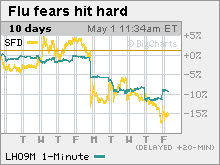It's still safe to bring home the bacon
Call it swine flu or H1N1. But the outbreak has led to bans on pork and falling prices of commodities and pork processors. It looks like an overreaction.

 |
| The price of lean hog futures have plunged on concerns about swine flu. And that's hit shares of pork processor Smithfield Foods. |
NEW YORK (CNNMoney.com) -- You can't catch swine flu from eating a pork chop or slice of bacon. But that hasn't stopped people around the world from panicking.
Several countries, including Russia, China and Thailand, have banned imports on pork from Mexico and some U.S. states.
These bans, coupled with concerns that people in the U.S. will stop buying any food made from pigs due to fears that they may catch the virus, have led to sharp sell-offs in commodities and shares of pork producers this week.
The prices of hog futures and pork bellies have fallen this week in active trading on commodities exchanges. Since news of the swine flu outbreak started to surface late last week, lean hog prices have plunged more than 10% and pork belly futures are down about 4%.
That hit the stocks of several U.S. food companies earlier this week. Shares of the world's largest pork producer Smithfield Foods (SFD, Fortune 500), are down about 15% this week. Two other big pork processors, Hormel Foods (HRL, Fortune 500) and Tyson Foods (TSN, Fortune 500) fell on Monday but have bounced back since then.
But should investors, or lovers of ham and sausage for that matter, really steer clear of pork products?
The plunge in commodity prices and shares of Smithfield do appear to be a bit of an overreaction -- kind of like what happened earlier this week when shares of some small biotechs surged and shares of almost all Mexican companies plunged.
And the panic may be one reason why health officials are now trying to brand the disease with the more clinical name of H1N1 flu, a moniker that seeks to remind people that the disease is being transmitted from human to human, not pig to person.
According to the Centers for Disease Control and Prevention in Atlanta, "swine influenza viruses are not transmitted by food. You cannot get swine influenza from eating pork or pork products."
The CDC recommends that anyone concerned about H1N1 should make sure that pork is properly cooked. In other words, prepare pork like you normally would.
Still, Wall Street remains worried. JPMorgan analyst Ken Morgan cut some quarterly estimates for Smithfield and Tyson on Monday.
"The fear generated by a disease named after hogs cannot be good for pork consumption," he wrote in a research note, adding that some meat grocers he spoke to mentioned that customers were asking questions about swine flu.
Barclays Capital analyst Christopher Bledsoe downgraded Smithfield Foods to an "underweight", the equivalent of a "sell" on Wednesday.
In his report, Bledsoe wrote that "the fact that pork is deemed safe to eat when properly cooked is likely to be ignored initially by enough consumers and governments globally" to affect Smithfield's financial results.
To be sure, there are other reasons to be wary of companies like Smithfield and Tyson. Both companies are still reeling from last year's superspike in the price of several commodities, most notably corn. That led to significant cost increases for both firms since corn is a major ingredient fed to livestock.
What's more, Smithfield and Tyson have suffered from weak sales in recent months due to the recession. The combination of higher costs and sluggish sales caused Smithfield to report a loss in its past three quarters. Analysts are forecasting a loss for its fiscal fourth quarter, which just ended Thursday, as well.
And Tyson, which will report results for its fiscal second quarter ending in March on Monday, is also expected to post a loss on flat sales. That would be Tyson's second consecutive loss.
However, investors are increasingly betting that the recession could end later this year. And there are some tentative signs of stabilization. So if the recovery calls turn out to be accurate, then companies like Smithfield should be able to bounce back.
Vicki Bryan, an analyst with fixed-income research firm Gimme Credit, wrote in a report Tuesday that Smithfield has been doing a good job of cutting debt and raising cash as of late.
So even with the swine flu fears weighing on the stock, there is still a good chance that the company will still be able to post better results later in the year.
"The timing is unfortunate for the pork industry, which has been trying to curb over-production in step with falling demand. Smithfield is in better shape this year to meet this unexpected challenge," Bryan wrote.
Still, it seems like shares of Smithfield and Tyson may continue to be volatile until H1N1 flu fears subside. But based on what we know so far, the companies don't appear to be as risky a long-term bet as investors thought earlier in the week.
And while you're at it, don't feel the need to tell the guy at your favorite deli to hold the B when ordering a BLT either.
Want a Money Makeover? E-mail us at makeover@moneymail.com. For the CNNMoney.com Comment Policy, click here. ![]()

